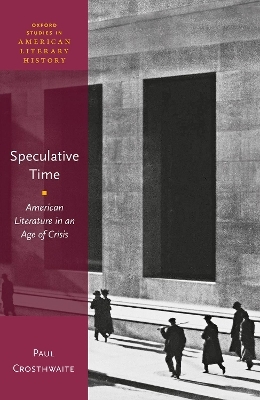
Speculative Time
American Literature in an Age of Crisis
Seiten
2024
Oxford University Press (Verlag)
978-0-19-889179-6 (ISBN)
Oxford University Press (Verlag)
978-0-19-889179-6 (ISBN)
Speculative Time examines how a climate of financial and economic speculation and disaster shaped the literary culture of the United States in the early to mid-twentieth century. It argues that speculation's risk-laden and crisis-prone temporalities had major impacts on writing in the period, and on important aspects of visual representation.
Speculative Time: American Literature in an Age of Crisis examines how a climate of financial and economic speculation and disaster shaped the literary culture of the United States in the early to mid-twentieth century. It argues that speculation's risk-laden and crisis-prone temporalities had major impacts on writing in the period, as well as on important aspects of visual representation. The conceptions of time-and especially futurity-arising from the theory and practice of speculation provided crucial models for writers' and other artists' aesthetic, intellectual, and political concerns and strategies. The attractions and dangers of speculation were most spectacularly apparent in the period's pivotal economic event: the Wall Street Crash of 1929. The book offers an innovative account of how the speculative boom and bust of the "Roaring Twenties" affected literary and cultural production in the United States. It situates the stock market gyrations of the 1920s and 1930s within a wider culture of speculation that was profoundly shaped by, but extended well beyond, the brokerages and trading floors of Wall Street. The early to mid-twentieth century was a “speculative time,” an age characterized by leaps of economic, political, intellectual, and literary speculation; and the notion of speculative time provides a means of understanding the period's characteristic temporal modes and textures, as evident in work by figures including F. Scott Fitzgerald, John Dos Passos, Nathan Asch, William Faulkner, Federico García Lorca, James N. Rosenberg, Margaret Bourke-White, Archibald MacLeish, Christina Stead, Claude McKay, Richard Wright, and Ralph Ellison.
Speculative Time: American Literature in an Age of Crisis examines how a climate of financial and economic speculation and disaster shaped the literary culture of the United States in the early to mid-twentieth century. It argues that speculation's risk-laden and crisis-prone temporalities had major impacts on writing in the period, as well as on important aspects of visual representation. The conceptions of time-and especially futurity-arising from the theory and practice of speculation provided crucial models for writers' and other artists' aesthetic, intellectual, and political concerns and strategies. The attractions and dangers of speculation were most spectacularly apparent in the period's pivotal economic event: the Wall Street Crash of 1929. The book offers an innovative account of how the speculative boom and bust of the "Roaring Twenties" affected literary and cultural production in the United States. It situates the stock market gyrations of the 1920s and 1930s within a wider culture of speculation that was profoundly shaped by, but extended well beyond, the brokerages and trading floors of Wall Street. The early to mid-twentieth century was a “speculative time,” an age characterized by leaps of economic, political, intellectual, and literary speculation; and the notion of speculative time provides a means of understanding the period's characteristic temporal modes and textures, as evident in work by figures including F. Scott Fitzgerald, John Dos Passos, Nathan Asch, William Faulkner, Federico García Lorca, James N. Rosenberg, Margaret Bourke-White, Archibald MacLeish, Christina Stead, Claude McKay, Richard Wright, and Ralph Ellison.
Paul Crosthwaite is Professor of Modern and Contemporary Literature at the University of Edinburgh, where he has worked since 2011. Prior to joining Edinburgh, he was a lecturer and member of the Centre for Critical and Cultural Theory at Cardiff University. He completed his PhD at Newcastle University in 2007.
Acknowledgements
Introduction
1: Speculation, Prediction, and the Great Crash of 1929
2: "A Touch of Disaster": (Pre)figuring Crisis in F. Scott Fitzgerald, John Dos Passos, and Nathan Asch
3: "Like a Flood or an Earthquake": Literary and Visual Representation at a Moment of Crisis
4: "To Will a Future": Economic Fatalism and Performativity in Archibald MacLeish's Panic
5:
| Erscheinungsdatum | 02.03.2024 |
|---|---|
| Reihe/Serie | Oxford Studies in American Literary History |
| Zusatzinfo | 15 |
| Verlagsort | Oxford |
| Sprache | englisch |
| Maße | 162 x 242 mm |
| Gewicht | 628 g |
| Themenwelt | Geschichte ► Allgemeine Geschichte ► Neuzeit (bis 1918) |
| Geisteswissenschaften ► Geschichte ► Regional- / Ländergeschichte | |
| Geisteswissenschaften ► Sprach- / Literaturwissenschaft ► Anglistik / Amerikanistik | |
| Geisteswissenschaften ► Sprach- / Literaturwissenschaft ► Literaturwissenschaft | |
| ISBN-10 | 0-19-889179-2 / 0198891792 |
| ISBN-13 | 978-0-19-889179-6 / 9780198891796 |
| Zustand | Neuware |
| Informationen gemäß Produktsicherheitsverordnung (GPSR) | |
| Haben Sie eine Frage zum Produkt? |
Mehr entdecken
aus dem Bereich
aus dem Bereich
Giordano Bruno - ein ketzerisches Leben
Buch | Hardcover (2024)
C.H.Beck (Verlag)
29,90 €
das dramatische 16. Jahrhundert
Buch | Hardcover (2024)
Rowohlt Berlin (Verlag)
34,00 €
Kunst und Gesellschaft an der Schwelle zur globalen Welt
Buch | Hardcover (2024)
Klett-Cotta (Verlag)
42,00 €


